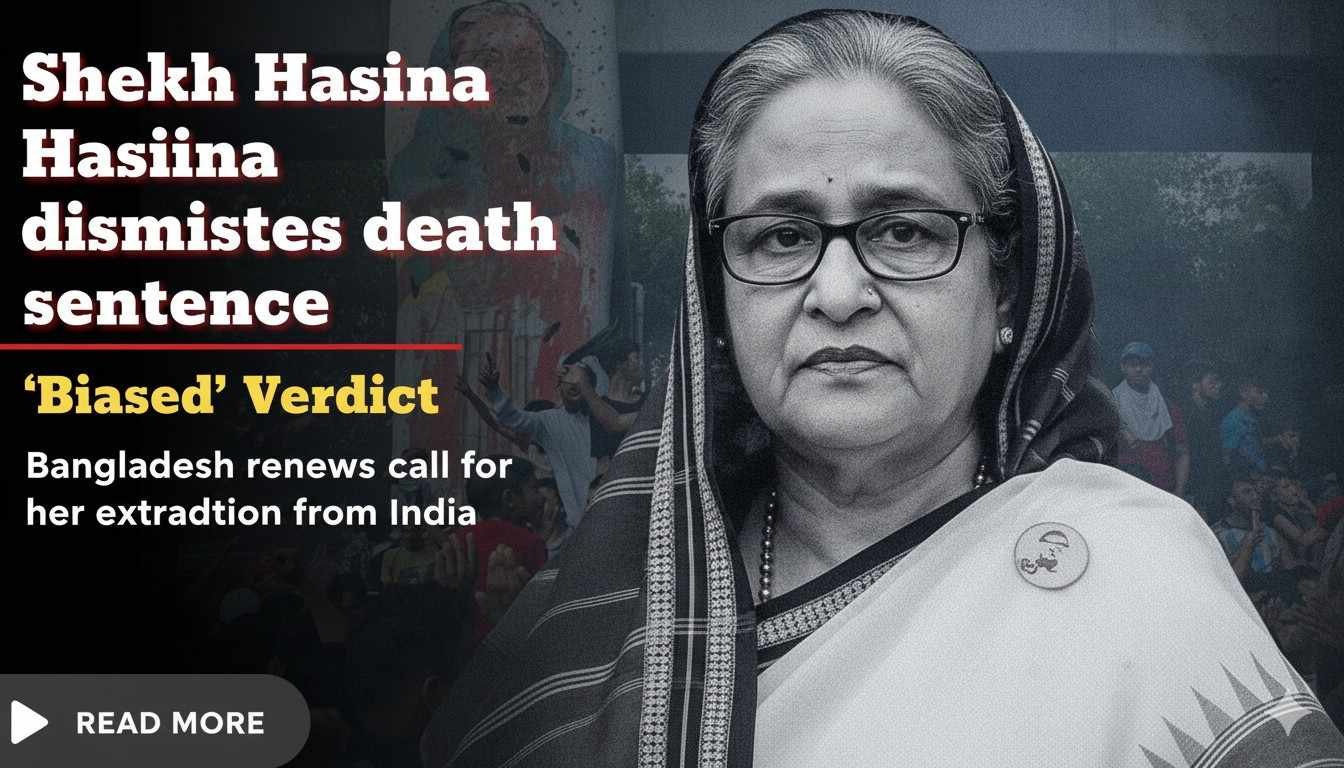Sheikh Hasina Rejects Death Sentence as ‘Biased’; Bangladesh Renews Push for Her Extradition from India

The political temperature across South Asia rose sharply on Monday after former Bangladesh Prime Minister Sheikh Hasina rejected the death sentence issued against her, calling it “biased and politically motivated,” even as the interim government in Dhaka renewed its push for her extradition from India. The dramatic escalation has forced New Delhi into a sensitive diplomatic spotlight, balancing regional stability with legal obligations and humanitarian concerns.
Dhaka’s interim administration, led by Nobel laureate economist Muhammad Yunus, cited the verdict of the International Crimes Tribunal (Bangladesh) to demand that India immediately hand over both Sheikh Hasina and former Home Minister Asaduzzaman Khan Kamal. The government declared that any foreign nation offering shelter to the two leaders, who were convicted in absentia for “crimes against humanity” related to the July–August 2024 student protests, would be seen as making an “unfriendly gesture” toward Bangladesh. This assertive statement underscores the growing tension between the two neighbours at a time when Bangladesh is navigating its most volatile political transition in decades.
New Delhi, however, responded with characteristic caution. The Ministry of External Affairs stated that India remained committed to supporting the “best interests of the people of Bangladesh,” emphasizing peace, stability, and democratic inclusion, without directly addressing Dhaka’s extradition request. MEA spokesperson Randhir Jaiswal reiterated that India would engage constructively with all stakeholders, a diplomatic way of acknowledging the complex situation without making commitments that could endanger Hasina, who is believed to be staying at an undisclosed location under Indian security.
Behind the scenes, sources in New Delhi suggest that India is unlikely to hand over the deposed leader. The 2013 extradition treaty between the two countries includes a clear provision allowing India to reject extradition requests if the alleged offences are political in nature—an argument that fits squarely with Hasina’s claim that the tribunal is a “rigged” institution set up by an unelected government. Her strongly worded statement accused Islamic extremist elements within the interim regime of undermining Bangladesh’s secular identity and enabling attacks on minorities and women, further complicating the optics of returning her to a country where her safety is uncertain.
The high-stakes debate is expected to intensify as National Security Advisor Ajit Doval prepares to meet his Bangladeshi counterpart Khalilur Rahman in New Delhi this week. Although Rahman is in India to attend the Colombo Security Conclave, the extradition issue is expected to dominate bilateral discussions. His visit marks the first high-level contact from Dhaka since Hasina’s government collapsed after mass protests in August 2024, forcing her to flee to India aboard a military aircraft.
What happens next will likely shape India–Bangladesh relations for years. While Dhaka seeks to assert its authority, New Delhi must weigh regional diplomacy, domestic political sentiment, and human rights concerns. With both nations navigating sensitive political waters, the standoff over Sheikh Hasina’s future has become a defining moment for South Asian geopolitics.
Disclaimer: The information provided in this blog is for general guidance only and is not intended to serve as medical or dietary advice. While the subject is widely recognized for its importance, political and legal situations can be complex and evolving. Before drawing conclusions or taking action based on this content, readers should consult official government statements or verified legal sources. The insights shared here are designed to inform and explain but should not be used as a substitute for professional advice or authoritative reports.